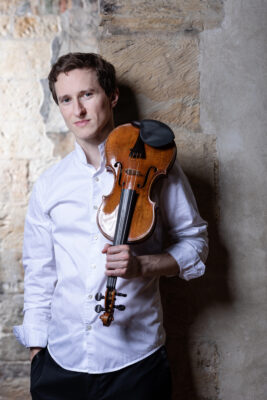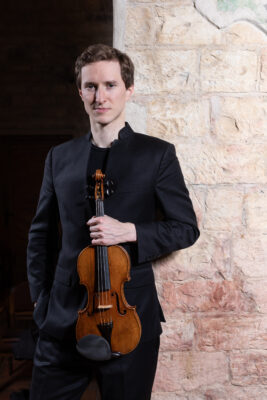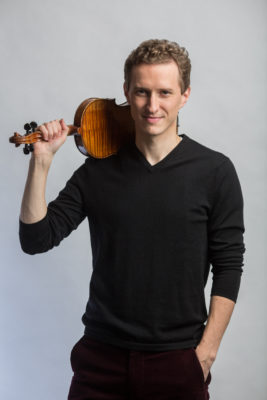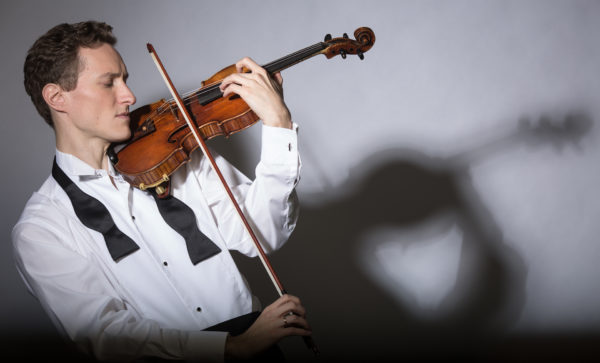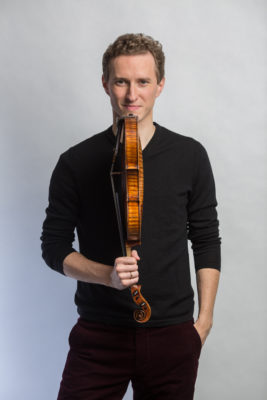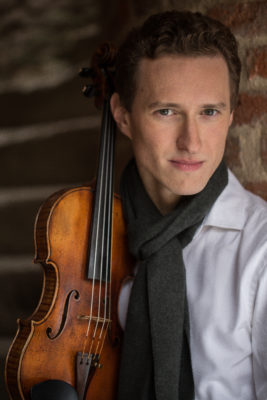Josef Špaček
ViolinPraised for his remarkable range of colours, his confident and concentrated stage presence, his virtuosity and technical poise as well as the beauty of his tone Josef Špaček has gradually emerged as one of the leading violinists of his generation. His performances of a wide range of repertoire demonstrate his “astonishing articulation and athleticism” (The Scotsman) and “a richness and piquancy of timbre.” (The Telegraph).
Read morePraised for his remarkable range of colours, his confident and concentrated stage presence, his virtuosity and technical poise as well as the beauty of his tone Josef Špaček has gradually emerged as one of the leading violinists of his generation. His performances of a wide range of repertoire demonstrate his “astonishing articulation and athleticism” (The Scotsman) and “a richness and piquancy of timbre.” (The Telegraph).
Forthcoming highlights include debuts with the Gewandhausorchester Leipzig and Semyon Bychkov, the Orchestre National de Lille and Jan-Willem de Vriend, concerts with Sinfonia Varsovia and Marta Gardolińska in Warsaw and Brussels, a concerto and recital tour in China, as well as returns to the Dresdner Philharmonie and Kahchun Wong, the Czech Philharmonic Orchestra and Tomáš Netopil, the Berner Symphoniker and Anna Sułkowska-Migoń, the Macao Orchestra and Lio Kuokman, the Symphoniker Hamburg and Jiří Rožeň and the Bochumer Symphoniker and Giuseppe Mengoli,
Recent highlights include highly successful debuts with the Chicago Symphony Orchestra and Jakub Hrůša (“his steely technique handling the angular bonhomie as surely as the passing lyrical strains. In the Andante, Špaček rendered the lovely main theme with a beguiling tenderness and sweetness of tone that recalled Suk, his illustrious predecessor.” – CCR), with the Atlanta Symphony Orchestra and Nathalie Stutzmann, the Dutch Radio Philharmonic Orchestra and Tomáš Netopil, as well as a residency with the Residentie Orchestra The Hague with Anja Bihlmaier and Jun Märkl. He also returned to the Verbier Festival for a performance of the Barber concerto with the Verbier Festival Junior Orchestra and James Gaffigan and chamber music concerts with among others Yunchan Lim, Kian Soltani, Pablo Ferrández, Lucas Debargue, Edgar Moreau, Lars Anders Tomter and Blythe Teh Engstroem.
With cellist Timotheos Gavriilidis-Petrin and pianist George Xiaoyuan Fu he forms the Trio Zimbalist. The trio regularly tours in the US and Europe. Their first CD release with piano trios of Weinberg, Auerbach and Dvořák received high accolades from the international press, including Gramophone Magazine’s Editor’s Choice in March 2024, describing the album as “miraculously fresh,” “imaginative,” and “inventive”.
In September 2023 Supraphon released Josef’s recording of Martinů’s Concerto for violin, piano and orchestra, violin sonata no. 3 and Five Short Pieces with pianist Miroslav Sekera and the Prague Radio Symphony Orchestra, conducted by Petr Popelka. The BBC Music Magazine commented that “Špaček and Sekera are virtuosic in the opening movement and searching in the Adagio. There’s a special piquancy in their Scherzo, and all these elements are combined in the finale, where Špaček’s violin tone has shining poise.”
Previous recordings for the Supraphon label are an album with cellist Tomáš Jamník, featuring works for violin and cello by Janáček, Martinů, Schulhoff and Klein; his highly praised recording of the violin concertos of Dvořák and Janáček, coupled with the Fantasy of Suk, with the Czech Philharmonic Orchestra conducted by Jiří Bělohlávek and a recital disc with works for violin and piano by Smetana, Janáček and Prokofiev with pianist Miroslav Sekera. Other recordings include an album with works for violin solo and violin and piano by H.W. Ernst (Naxos) and an early CD with the complete Sonatas for solo violin by Eugène Ysaÿe.
Other orchestras he appears with include the Orchestre de Paris, Rundfunk-Sinfonieorchester Berlin, Bamberger Symphoniker, Scottish Chamber Orchestra, Academy of St. Martin in the Fields, Deutsches Symphonie-Orchester Berlin, WDR Sinfonieorchester, Konzerthausorchester Berlin, Czech Philharmonic Orchestra, Tonhalle-Orchester Zürich, Helsinki Philharmonic Orchestra, Orchestre Philharmonique du Capitole de Toulouse, Orchestra Sinfonica Nazionale della RAI Torino, Tokyo Metropolitan Symphony Orchestra, Deutsche Radio Philharmonie, SWR-Symphonieorchester, Netherlands Philharmonic Orchestra, Rotterdam Philharmonic Orchestra, Orchestre Philharmonique de Luxembourg, Orchestre Philharmonique de Monte-Carlo, Taipei Symphony Orchestra and the Symfonieorkest Vlaanderen.
Josef Špaček collaborates with eminent conductors such as Jakub Hrůša, Semyon Bychkov, Manfred Honeck, Thomas Adès, Krzysztof Urbański, James Gaffigan, James Conlon, Maxim Emelyanchev, the late Jiří Bělohlávek, Petr Popelka, Thomas Søndergård, Cornelius Meister, Michael Sanderling, David Zinman, Eliahu Inbal, Tomáš Netopil, Pietari Inkinen, Marc Albrecht, Aziz Shokhakimov, Christian Vasquez, Sylvain Cambreling, Jahja Ling and Lio Kuokman.
He equally enjoys giving recitals and playing chamber music and is a regular guest at festivals and in concert halls throughout Europe (among others at the Rudolfinum in Prague, the Konzerthaus in Vienna, the Muziekgebouw aan ‘t IJ in Amsterdam, the Kronberg Academy, the Evian Festival, the Rosendal Festival, the Kaposfest and at Schloß Elmau), Asia and the USA (among others at Kennedy Center, Washington D.C., 92Y in New York, La Jolla in San Diego, the ChamberFest Cleveland and the Nevada Chamber Music Festival).
June 2024 saw the first edition of his own chamber music festival, the Troja Festival, in Prague.
Other chamber music partners include Gil Shaham, Kian Soltani, James Ehnes, Clemens Hagen, Julian Steckel, Gerhard Oppitz, Noah Bendix-Balgley, Máté Szücs, Miroslav Sekera, Tomáš Jamník, Federico Colli, Sharon Kam, Kristóf Baráti, Zoltan Fejervari and Suzana Bartal.
Josef Špaček studied with Itzhak Perlman at The Juilliard School in New York, Ida Kavafian and Jaime Laredo at the Curtis Institute of Music in Philadelphia, and with Jaroslav Foltýn at the Prague Conservatory. He was laureate of the International Queen Elisabeth Competition in Brussels, and won top prizes at the Michael Hill International Violin Competition in New Zealand, the Carl Nielsen International Violin Competition in Denmark and the Young Concert Artists International Auditions in New York.
He served as concertmaster of the Czech Philharmonic Orchestra, the youngest in its history, until the end of the 2019/20 season and has since devoted himself exclusively to his solo career.
Josef Špaček performs on the ca. 1732 “LeBrun; Bouthillard” Guarneri del Gesù violin, generously on loan from Ingles & Hayday.
He lives in Prague with his wife and their three children. In his spare time he enjoys cycling.
Representation
General Management: Nymus Artists
Germany, Austria, Switzerland: Intermusica
Spain & Latin America: Diamond Artists
Japan: Amati Tokyo
China: Armstrong Music and Arts
Concerts
- November 4, 2024, 7:30 pm
Prague 1, Czechia
Municipal House - Smetana Hall
Prague Radio Symphony Orchestra
Conductor: Petr Popelka
Martinu – Violin Concerto No. 2, H. 293
https://prso.czechradio.eu - November 6, 2024, 8:00 pm
Hamburg, Germany
Elbphilharmonie Hamburg
Prague Radio Symphony Orchestra
Conductor: Petr Popelka
Martinu – Violin Concerto No. 2, H. 293
https://prso.czechradio.eu - November 16, 2024, 8:00 pm
Prague, Czechia
Rudolfinum
Czech Philharmonic Orchestra
Conductor: Petr Popelka
Suk – Fantasy in g minor for violin and orchestra, op. 24
https://www.ceskafilharmonie.cz/en/ - November 17, 2024, 8:00 pm
Prague, Czechia
Rudolfinum
Czech Philharmonic Orchestra
Conductor: Petr Popelka
Suk – Fantasy in g minor for violin and orchestra, op. 24
https://www.ceskafilharmonie.cz/en/ - November 18, 2024, 7:30 pm
Prague, Czechia
Rudolfinum
Trio Zimbalist
Auerbach – Piano Trio no. 1, op. 28
Weinberg – Piano trio, op. 24
Dvořák – Piano Trio no. 4 in e minor, op. 90 "Dumky"
https://www.ceskafilharmonie.cz/en/ - November 19, 2024, 8:30 pm
Thessaloniki, Greece
Thessaloniki Concert Hall
Trio Zimbalist
Auerbach – Piano Trio no. 1, op. 28
Weinberg – Piano trio, op. 24
Dvořák – Piano Trio no. 4 in e minor, op. 90 "Dumky"
https://www.tch.gr - November 24, 2024, 11:00 am
Hamburg, Germany
Laeiszhalle
Symphoniker Hamburg
Conductor: Jiří Rožeň
Dvořák – Violin Concerto in a minor, op. 53
https://www.symphonikerhamburg.de - November 28, 2024, 8:00 pm
Lille, France
Auditorium du Nouveau Siècle
Orchestre National de Lille
Conductor: Jan-Willem de Vriend
Mozart – Violin Concerto no. 5 in A major, KV 219
https://www.onlille.com - November 29, 2024, 8:00 pm
Utrecht, Netherlands
TivoliVredenburg
Orchestre National de Lille
Conductor: Jan-Willem de Vriend
Mozart – Violin Concerto no. 5 in A major, KV 219
https://www.onlille.com - December 3, 2024, 8:00 pm
Lille, France
Auditorium du Nouveau Siècle
Orchestre National de Lille
Conductor: Jan-Willem de Vriend
Mozart – Violin Concerto no. 5 in A major, KV 219
https://www.onlille.com - December 4, 2024, 8:00 pm
Valenciennes, France
Le Phénix
Orchestre National de Lille
Conductor: Jan-Willem de Vriend
Mozart – Violin Concerto no. 5 in A major, KV 219
https://www.onlille.com - December 5, 2024, 8:30 pm
Laon, France
Maison des Arts et des Loisirs
Orchestre National de Lille
Conductor: Jan-Willem de Vriend
Mozart – Violin Concerto no. 5 in A major, KV 219
https://www.onlille.com
